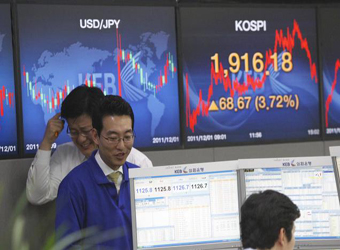Asian stocks swung between gains and losses as gauges China’s manufacturing growth beat analyst estimates and retail sales in the U.S. headed for the weakest holiday results since 2009.
Canon Inc., the world’s biggest camera maker, slipped 1.2 percent in Tokyo. KT Corp. dropped 6.8 percent after the South Korean phone company forecast lower dividends. Metcash Ltd. (MTS) climbed 7.5 percent in Sydney after the supplier of groceries to retailers posted first-half underlying profit that beat analyst estimates. Haitong Securities Co. advanced 5.7 percent in Hong Kong, pacing gains among Chinese brokerages, as the government prepares to end a ban on initial public offerings.
The MSCI Asia Pacific Index was little changed at 142 as of 2:02 p.m. in Hong Kong, having swung between gains of 0.1 percent and losses of 0.4 percent. About five shares declined for every four that rose on the gauge. More than $8 trillion has been added to the value of global equities this year, the biggest increase since 2009, as central banks took steps to shore up economies worldwide.
“There’s always going to be doubts about whether the growth we’re seeing in the U.S. is going to be sustainable after the central bank starts to taper stimulus,” said Nader Naeimi, Sydney-based head of dynamic asset allocation at AMP Capital Investors Ltd., which manages $131 billion. “While the U.S. market is starting to look frothy, we continue to see value in markets like China and Japan.”
China’s manufacturing purchasing managers’ index, released yesterday, came in at 51.4 for November, matching the 18-month high reached in October and beating 24 of 26 estimates in a Bloomberg News survey. A separate report for HSBC Holdings Plc and Markit Economics today showed PMI was at 50.8 last month, compared with 50.9 in October.
China, Thailand
The Shanghai Composite Index dropped 0.7 percent, heading for its biggest decline since Nov. 13, amid concern China’s plan to restart initial public offerings may divert funds from existing equities. Hong Kong’s Hang Seng Index advanced 0.5 percent, led by brokerages.
“The IPO plan is dragging stocks down, especially the small-cap shares,” said Xu Shengjun, analyst at Jianghai Securities Co. “With new stocks coming that are going to be much cheaper and more attractive, it’s ridiculous to want to buy the expensive small-caps.”
Thailand’s SET Index declined 1.1 percent. Protesters seeking to oust Prime Minister Yingluck Shinawatra vowed more unrest after clashes left three dead in Bangkok at the weekend. Global funds pulled a net $2.8 billion from Thai bonds and equities in November, official data show. Bank of Thailand Governor Prasarn Trairatvorakul said Nov. 30 that consumption, investment and tourism are being affected.
“The current political tension is indeed hurting the equity market sentiment,” Kum Soek Ching, head of Southeast Asia research at Credit Suisse Private Banking, said. “It’s likely to weigh down on the private consumption as well as probably GDP growth in the very near term.”
Regional Gauges
South Korea’s Kospi Index fell 0.7 percent as reports showed that the annual inflation rate quickened to 0.9 percent in November from 0.7 percent in October and manufacturing growth accelerated. Australia’s S&P/ASX slipped 0.8 percent and New Zealand’s NZX 50 Index lost 0.1 percent.
The Topix index closed little changed in Tokyo as reports showed Japanese capital spendingrose 1.5 percent in the third quarter and company profits jumped 24.1 percent. Singapore’s Straits Times Index rose 0.2 percent and Taiwan’s Taiex Index gained 0.1 percent.
The Asia-Pacific equity index jumped 9.8 percent this year through Nov. 29 amid signs the global economy is recovering. It traded at 14 times estimated earnings, the highest level since May, according to data compiled by Bloomberg. That compares with 16.3 on the Standard & Poor’s 500 Index last week and 15.2 for the Stoxx Europe 600 Index.
U.S. Futures
Futures on the S&P 500 Index gained less than 0.1 percent today. The gauge lost 0.1 percent on Nov. 29 as investors sold shares in the final half hour of a shortened trading session, erasing earlier gains fueled by a rally in online retailers amid Black Friday sales.
U.S. brick-and-mortar retailers eked out a 2.3 percent sales gain on Thanksgiving and Black Friday, in line with a prediction for the weakest holiday results since 2009.
China’s securities regulator issued a reform plan for initial public offerings Nov. 30, as the government prepares to lift a more than one-year freeze on new listings.
About 50 companies are expected to complete the IPO approval preparations and list or be ready to do so by the end of January, the China Securities Regulatory Commission said in a statement on its website at the weekend. There are more than 760 companies in the queue for approval and it will take about a year to complete an audit of all the applications, the regulator said.
Source: Bloomberg


